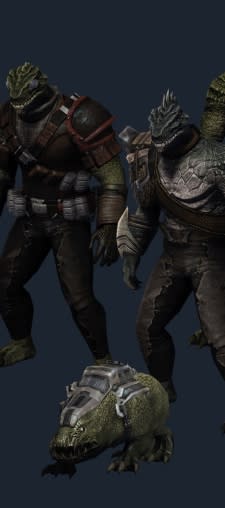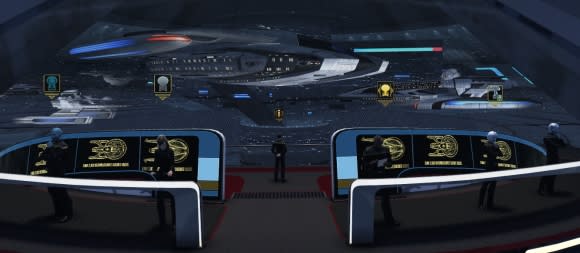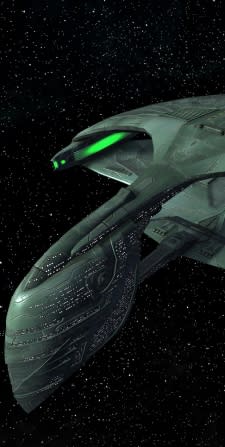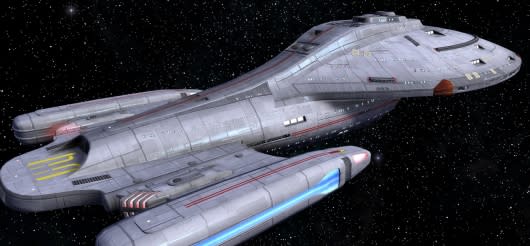Captain's Log Supplemental: A look at Star Trek Online's history with lead designer Al Rivera
Star Trek Online is a game that's got some history, not just by virtue of the franchise that's been running for half of forever but because the game itself has a rather madcap development history. Cryptic Studios got the license to develop the game at the eleventh hour, and the caveat was that the game needed to be shipped in the same timeframe as the original developer had promised -- leaving almost no time for development.
I sat down and talked with lead designer Al Rivera about the game's history, its development ethos, and where the game is going with the upcoming release of the second expansion, Delta Rising. It's been a long process, but Rivera shed some light on how the game is designed by its modern team, why things launched the way they did, and what players can expect as the game continues toward its five-year anniversary.

Rivera explained that when the team picked up the license for Star Trek Online, it was a known fact that they would be working on an incredibly compressed deadline. The game was built from scratch in 14 months, an incredibly accelerated timetable for any game, much less one that had a full space game and a full ground game in place.
Corners had to be cut. Rivera looks back at the launch version and notes that it was riddled with flaws -- crafting was so minimal as to barely be worthy of the name, the content was far from perfect, there were gaps in the leveling experience, and there was a lot of trimming up to do. That was the team's first focus once the game went live, polishing up the systems that had been thrown together under an compressed deadline.
The studio's purchase by Perfect World Entertainment and the move to free-to-play heralded a big change in the way that the game could be developed, however. Before, the game had a very small team simply by necessity of being a fairly small studio, but the success of the free-to-play model and the acquisition by a bigger publisher meant more money to go into the game. That meant that the team could push forward a new quality standard. Rivera explained it as centering around a philosophy of having no orphaned content or systems in the game. The oldest parts of the game, the weakest links in terms of quality standards, need to constantly be given rolling updates in order to match the quality level of the most recent additions.
Of course, the game needs to make money to remain viable, but Cryptic has tried to live by the watchword that there is no content that requires a payment. Ships, costumes, consumables, all of that can be bought, but the missions and the stories should always be free. You can log in and play, and the existence of the Dilithium-to-Zen exchange interface makes even the cosmetic stuff obtainable by free players.
The game's first expansion, Legacy of Romulus, marks what Rivera sees as a major turning point for the game with the creation of a viable endgame. Every update the game has is meant to both improve one aspect of the game that's already in place and add something new; what's already there will either be improved or, in severe cases, removed. That was what ultimately led to the exploration missions getting the axe. The missions had filled out gaps in the initial leveling experience at launch, but they simply weren't up to the quality standard of the rest of the game, and that meant they merited removal.

The rolling updates will continue, as well; the Romulan arc for the Federation, for example, is next on the remake block. Bridge officer training and the skill system are also under examination as things that need to be brought up to par with the rest of the game.
I asked Rivera about the level cap increase and the Tier 6 ships, and he explained that raising the cap was something that seemed natural but also brought with it certain pitfalls. The team didn't want to invalidate the existing content in the game or the ships that players had purchased already; at the same time, upgrading levels needed to feel like a boost in power. Tier 5 ships are meant to remain viable, even if you never upgrade them.

Part of this is accomplished by having the game's difficulty be tested and balanced with Tier 5 ships; another change is how the game structures its queue mechanics. Essentially, the difficulties of PvE queues will be adjusted, and the challenges that are currently at Elite difficult will be rebranded as a midway point between the Level 60 Tier 5u/Tier 6 queues, with a separate Elite queue for the very top. Rivera explained that players will still be able to get marks and other rewards that they currently receive in the level 50 queues; the highest queues that require an upgraded ship just offer more rewards.
Rivera also talked a bit about the game's design moving forward and exploring the Delta quadrant before the Gamma quadrant or other locations. While the Gamma quadrant is at the root of a beloved series, there are far fewer canonical explorations in that region of space, and the team feels that when people play Star Trek Online they want to see elements that are from Star Trek. Things that the team just made up to fit in the universe feel less compelling.
Another focus in the expansion is giving characters a specialization, which is an important aspect that the game hasn't emphasized before. While STO can't add new classes to the game easily, it can focus on specialties that still feel more novel. The focus on Intelligence operations is just the beginning, and future ships and the like will focus on other specialties captains can pick up. It's fundamentally a way to include the flavor of having a new character option without throwing the game's usual system off the rails.
STO has some history, and it launched on a ridiculously accelerated timetable. But the developers in charge of the game are working hard to ensure that the game can get better over time and be more satisfying for everyone. It isn't perfect, but if you were around at launch, it's clear that the game has come a long way.

Space, the final frontier. These are the voyages of the starship Massively, as recorded monthly in Captain's Log by Eliot Lefebvre.Its continuing mission -- to explore strange new game systems in Star Trek Online. To seek out new content and new experiences. To boldly go where many captains may or may not already be going, but they seem to be having fun, right?


